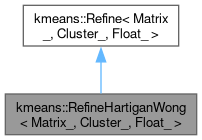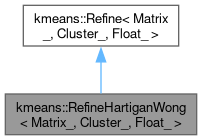Implements the Hartigan-Wong algorithm for k-means clustering. More...
#include <RefineHartiganWong.hpp>


Public Member Functions | |
| RefineHartiganWong (RefineHartiganWongOptions options) | |
| RefineHartiganWong ()=default | |
| RefineHartiganWongOptions & | get_options () |
 Public Member Functions inherited from kmeans::Refine< Index_, Data_, Cluster_, Float_, Matrix_ > Public Member Functions inherited from kmeans::Refine< Index_, Data_, Cluster_, Float_, Matrix_ > | |
| virtual Details< Index_ > | run (const Matrix_ &data, Cluster_ num_centers, Float_ *centers, Cluster_ *clusters) const =0 |
Detailed Description
class kmeans::RefineHartiganWong< Index_, Data_, Cluster_, Float_, Matrix_ >
Implements the Hartigan-Wong algorithm for k-means clustering.
The Hartigan-Wong algorithm performs several iterations of transferring points between clusters, involving a computationally expensive "optimal transfer" step that checks each observation against each cluster to determine its best assignment, followed by a cheaper "quick transfer" step, which iterates between the best and second-best cluster choices for each observation. The latter enables rapid exploration of the local solution space without the unnecessary expense of repeatedly comparing each observation to all clusters. The choice of "best" cluster for each observation considers the gain/loss in the sum of squares when an observation moves between clusters, even accounting for the shift in the cluster centers after the transfer. The algorithm terminates when no observation wishes to transfer between clusters.
This implementation is derived from the Fortran code underlying the kmeans function in the stats R package, which in turn is taken from Hartigan and Wong (1979).
In the Details::status returned by run(), the status code is either 0 (success), 2 (maximum optimal transfer iterations reached without convergence) or 4 (maximum quick transfer iterations reached without convergence, if RefineHartiganWongOptions::quit_on_quick_transfer_convergence_failure = true). Previous versions of the library would report a status code of 1 upon encountering an empty cluster, but these are now just ignored.
In the Details::iterations returned by run(), the reported number of iterations is that of the optimal transfers.
- Template Parameters
-
Index_ Integer type of the observation indices. This should be the same as the index type of Matrix_.Data_ Numeric type of the input dataset. This should be the same as the data type of Matrix_.Cluster_ Integer type of the cluster assignments. Float_ Floating-point type of the centroids. This will also be used for the internal distance calculations. Matrix_ Class satisfying the Matrixinterface.
- See also
- Hartigan, J. A. and Wong, M. A. (1979). Algorithm AS 136: A K-means clustering algorithm. Applied Statistics, 28, 100-108.
Constructor & Destructor Documentation
◆ RefineHartiganWong() [1/2]
|
inline |
- Parameters
-
options Further options for the Hartigan-Wong algorithm.
◆ RefineHartiganWong() [2/2]
|
default |
Default constructor.
Member Function Documentation
◆ get_options()
|
inline |
- Returns
- Options for Hartigan-Wong clustering. This can be modified prior to calling
run().
The documentation for this class was generated from the following file:
- kmeans/RefineHartiganWong.hpp
Generated by